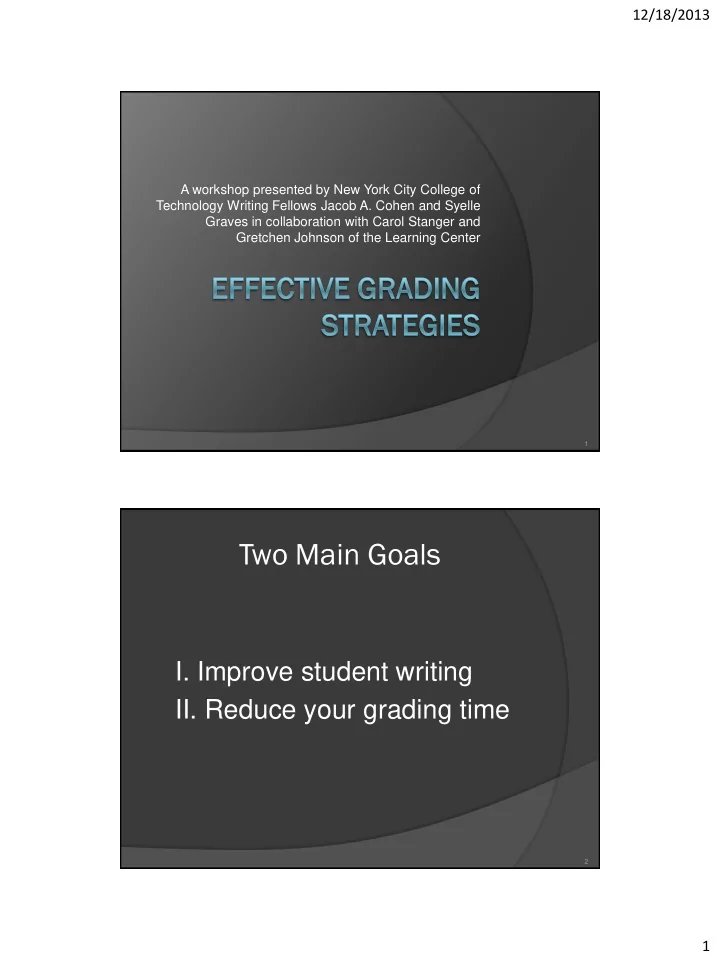

12/18/2013 A workshop presented by New York City College of Technology Writing Fellows Jacob A. Cohen and Syelle Graves in collaboration with Carol Stanger and Gretchen Johnson of the Learning Center 1 Two Main Goals I. Improve student writing II. Reduce your grading time 2 1
12/18/2013 What do we look for and mark when grading writing? Working together in a group, take two minutes to brainstorm the elements that you evaluate when grading a student paper (e.g. thesis, spelling, etc.) 3 Higher-Order Lower-Order Concerns Concerns Thesis statement Spelling Quality of argument/ideas Grammar (agreement) Evidence used correctly Formatting (font, spacing) Logic of conclusions Citation Use of topic sentences Punctuation Organization of paper Sentence structure Follows assignment? Vocabulary/word choice Style 4 2
12/18/2013 Instructor Feedback: What is our intent? How do students perceive feedback? Improving vs. correcting Coach vs. judge Assessment to facilitate revisions vs. copy editing Video —Beyond the Red Ink: Teacher’s Comments Through Students’ Eyes Students at Bunker Hill Community College, Boston, MA 5 Gretchen Johnson, College Assistant and Writing Consultant 6 3
12/18/2013 Effective Grading Strategies Overview Strategies: 1. Minimal marking 2. Supportive responding 3. Rubrics 4. Planning ahead to make grading more efficient 7 Strategy # 1: Minimal Marking Focus on higher-order concerns (organization, etc.) not on grammatical structure Focus on patterns (global errors) Aim for one comment per error type Additional tips for multiple-draft assignments: Straight and squiggly lines Line-edit one or two paragraphs only Avoid comments on things that will be removed Identify sentences with errors, but leave corrections to students 8 4
12/18/2013 Minimal Marking: Avoid comments on material that will be removed (Sommers) 9 Strategy # 2: Supportive Responding Use any color ink or pencil… except red Ask questions Write in legible, complete sentences Try little or no negative criticism in margins Positive reinforcement “Your supporting arguments need some development, but your thesis statement is clear and strong.” “You have this one great topic sentence here— now add similar topic sentences to your other paragraphs!” 10 5
12/18/2013 Supportive Responding (Walk) 11 Strategy # 2: Supportive Responding — End Comments Sandwich negative comments between positive ones Personalize the response Make neutral descriptions – this is what you did (I am aware of what you’re doing) Type if possible or helpful Can save time on drafts because you can re-read your old comments 12 6
12/18/2013 Group Grading Exercise 13 Strategy #3: Rubrics Can use as checklist For you and for student Makes grading technique transparent to students Makes grading more directed Effective way to communicate goals to students Holistic vs. task-specific 14 7
12/18/2013 Strategy # 4: Planning ahead to make grading more efficient Not all assignments need to be graded Try check-in assignments Try uncollected writing assignments Peer Review Learning Center 15 Carol Stanger, English Coordinator 16 8
12/18/2013 References Bean, John C. Engaging Ideas . 2 nd edition. San Francisco: Jossey-Bass, 2011. Elbow, Peter. “High Stakes and Low Stakes in Assigning and Responding to Writing.” In Writing to Learn: Strategies for Assigning and Responding to Writing in the Disciplines , ed. Mary Deane Sorcinelli and Peter Elbow. San Francisco: Jossey-Bass, 1997. Harris, Muriel. “The Overgraded Paper: Another Case of More is Less.” In How to Handle the Paper Load , ed. Gene Stanford, 91-94. Urbana, IL: National Council of Teachers of English, 1979. Sommers , Nancy. “Responding to Student Writing.” College Composition and Communication 33, no. 2 (May 1982): 148- 156. Walk, Kerry. “Teaching with Writing: A Guide for Faculty and Graduate Students.” Princeton Writing Program : 30-40. 17 9
Recommend
More recommend